Key takeaways:
- Lawyers serve as crucial advocates in navigating the legal complexities following a car accident, providing expert guidance and emotional support.
- Effective communication with your lawyer, including asking questions and sharing concerns, is essential for a productive attorney-client relationship.
- Understanding the financial implications of compensation, including documenting all expenses and recognizing both economic and non-economic damages, is vital for a successful claim.
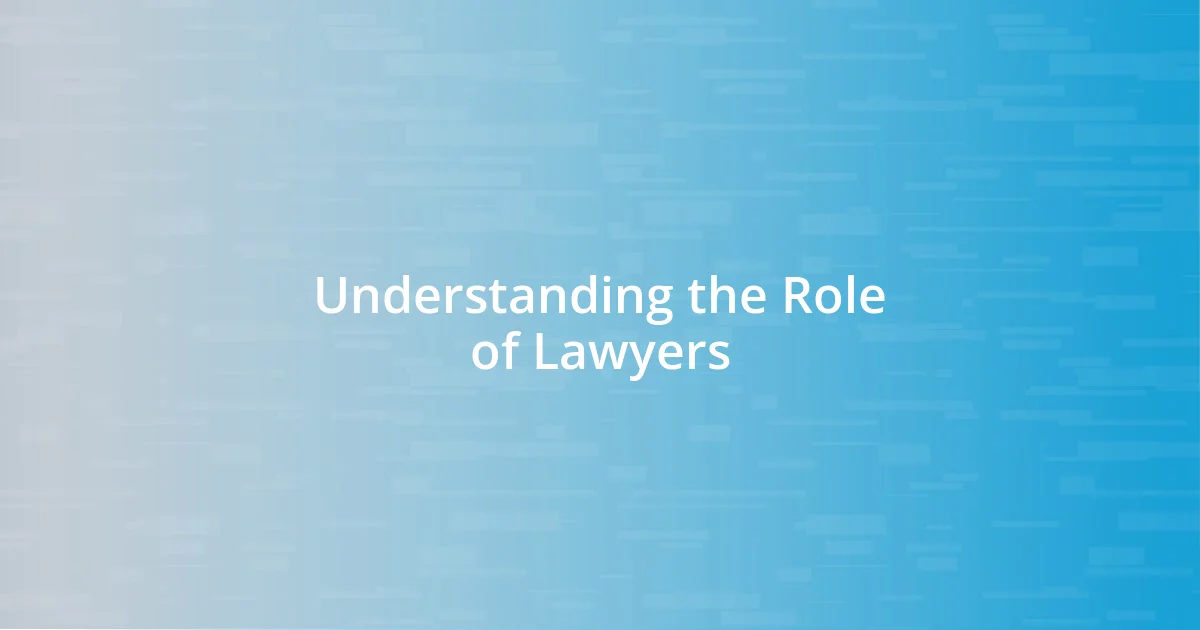
Understanding the Role of Lawyers
Lawyers play a crucial role in navigating the complex waters of legal claims, especially after a car accident. I remember sitting in my lawyer’s office, feeling overwhelmed, and realizing just how much I was relying on their expertise. They’re not just legal representatives; they’re advocates who fight for your rights, ensuring you get the justice you deserve.
When I first met with my lawyer, I found myself wondering: how can one person know so much about the law? It was comforting to learn that their extensive training and experience means they can anticipate challenges and devise strategies that I would never have considered on my own. They break down the legal jargon into understandable terms, making it feel less like a battle and more like a collaboration.
Moreover, a good lawyer doesn’t just throw information at you; they listen and understand your unique situation. I felt truly seen when my attorney took the time to discuss my concerns and explain every step of the process. Have you ever had someone genuinely care about your well-being in a professional setting? That personal touch can make all the difference in how we experience the legal system.
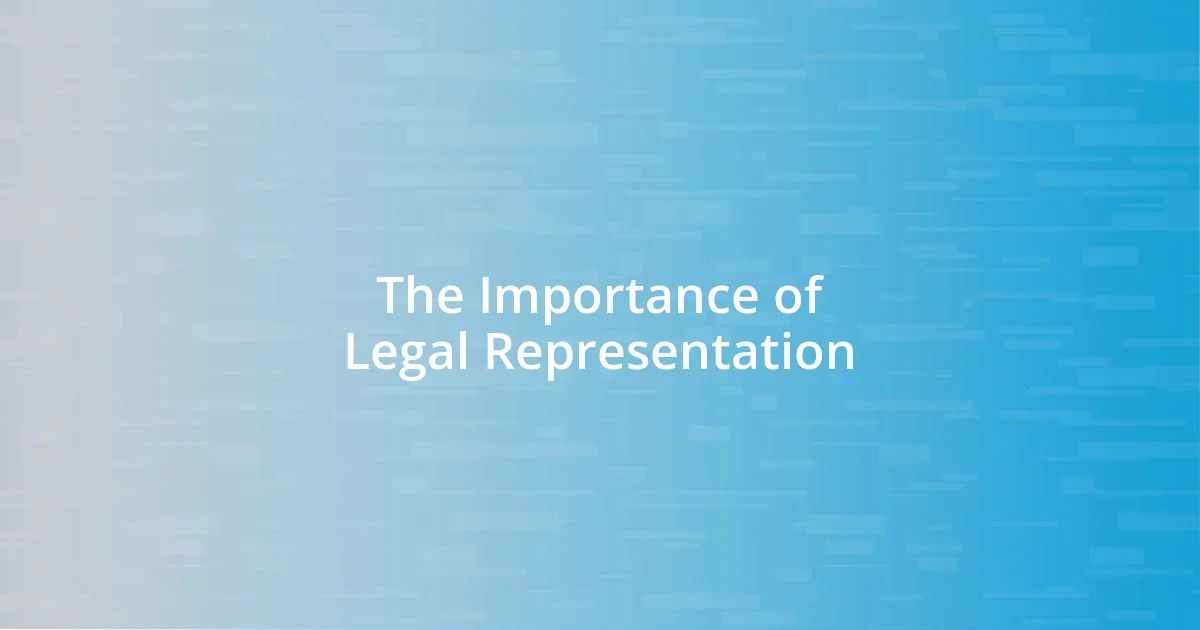
The Importance of Legal Representation
Legal representation is vital, especially in the aftermath of a car accident. From my own experience, having a skilled lawyer by your side can make the world of difference. I still remember the relief I felt when my attorney laid out a clear plan to tackle my case. It was as if a weight had been lifted off my shoulders, knowing I had someone in my corner who truly understood the legal landscape.
Here are some key reasons why having legal representation is so important:
- Expert Guidance: Navigating legal processes can be daunting; lawyers streamline this journey.
- Maximized Compensation: A good lawyer advocates for your rights, working to ensure you receive fair compensation.
- Stress Reduction: They handle the complexities, allowing you to focus on healing—both physically and mentally.
- Strategic Planning: Experienced lawyers strategize, anticipating challenges and knowing how to overcome them.
- Negotiation Skills: Skilled lawyers negotiate with insurance companies, advocating for favorable outcomes for their clients.
Reflecting on my own situation, I found it incredibly reassuring to have someone knowledgeable ready to handle the negotiation phase. Their expertise not only improved my chances of a favorable settlement but also provided me with peace of mind during a turbulent time.

Lessons in Navigating Insurance Claims
Navigating insurance claims after a car accident can feel daunting, but I learned several vital lessons along the way. One experience that stands out is when my lawyer helped me understand the importance of documentation. Gathering evidence, from accident reports to medical records, is crucial. I remember the chaotic moments following my accident, when I was more focused on recovering than remembering details. My lawyer’s advice to keep meticulous records proved invaluable, ultimately strengthening my case.
Another lesson I absorbed was the art of negotiation. Initially, facing an insurance adjuster felt intimidating; I wasn’t sure if I could advocate for myself. However, with my lawyer’s coaching, I gained confidence. We practiced key points I wanted to address, which turned out to be game-changing. When I finally sat down to negotiate, I realized I was well-prepared and empowered—something I never expected to feel in such a stressful situation.
Lastly, I discovered the significance of patience. Insurance claims can take time, and I had to learn not to rush the process. I recall feeling frustrated during the waiting game. However, my lawyer reminded me that quality takes time. That patience allowed us to build a stronger case, ultimately leading to a more favorable outcome.
| Key Lesson | Description |
|---|---|
| Documentation | Keeping detailed records is essential for substantiating claims and can significantly impact case outcomes. |
| Negotiation Skills | Strong negotiation skills can empower clients, making them active participants in the claim process. |
| Patience | Taking the time to build a robust case can lead to better results, even when it feels frustrating. |
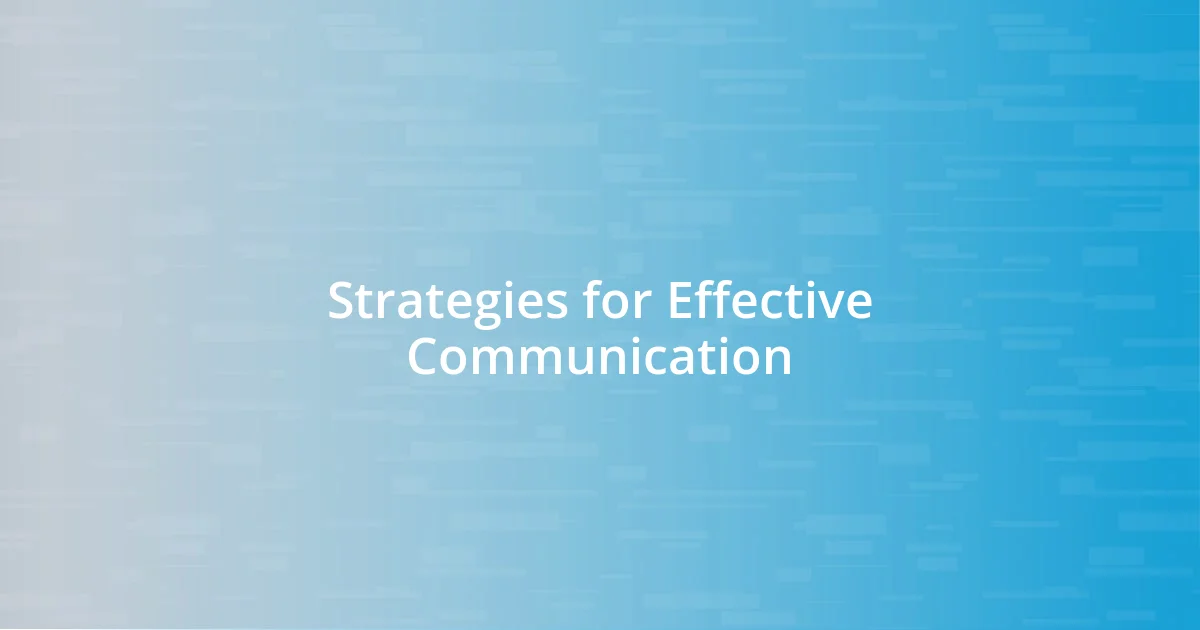
Strategies for Effective Communication
Effective communication with your lawyer can significantly influence the trajectory of your case. I remember one time when I felt overwhelmed trying to relay my version of events. My lawyer urged me to break it down into clear, simple points. This not only made our discussions more productive but also helped me express my concerns without getting lost in details. Have you ever felt like your thoughts were a jumbled mess when explaining something important? Trust me, organizing your thoughts can make a world of difference!
Another strategy I found particularly beneficial was asking questions—lots of them. It was through persistent questioning that I uncovered the nuances of my case that needed attention. I recall a moment when I hesitated to ask about a legal term that seemed complicated. But my lawyer smiled and encouraged me to speak up; clarity is key in our communication. This experience taught me that no question is too small, and being inquisitive fosters a deeper understanding of the legal process.
Lastly, making sure our communication felt like a two-way street was crucial. I appreciated how my lawyer made an effort to ensure I felt heard. During one of our meetings, they paused after laying out a complex strategy and asked, “How do you feel about this approach?” That question invited me to share my concerns openly. Have you considered how valuable it is to have your opinions recognized, especially when dealing with something as impactful as a car accident case? Knowing that my perspective mattered greatly enhanced my trust in our partnership.
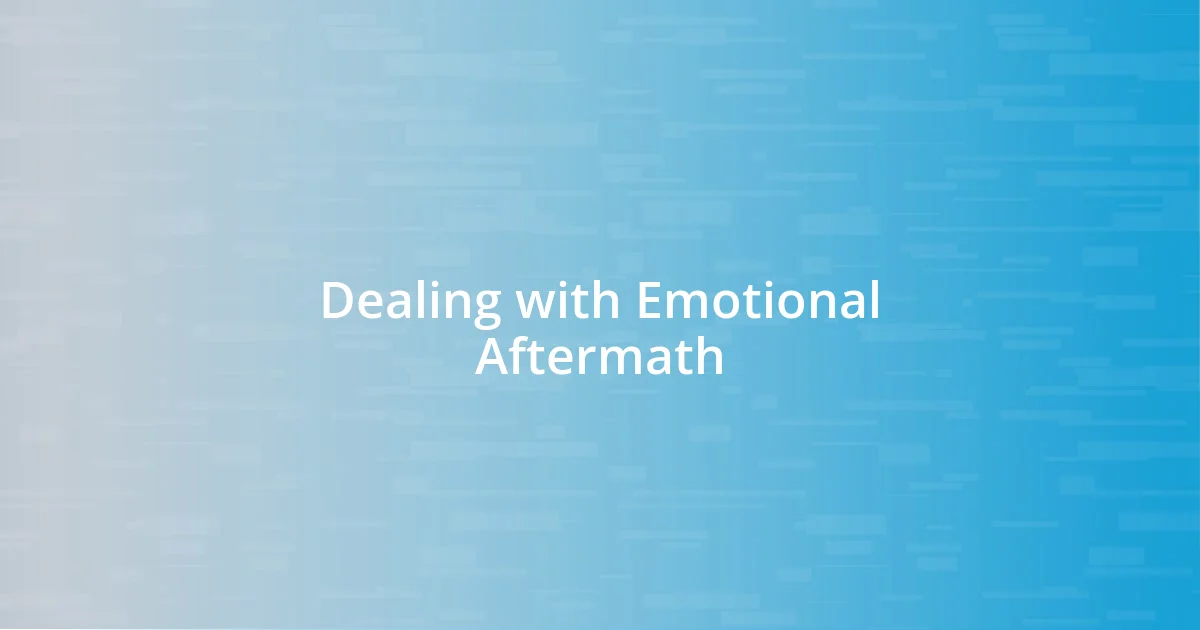
Dealing with Emotional Aftermath
Dealing with the emotional aftermath of a car accident is often overlooked, yet it profoundly affects your recovery journey. I still remember the wave of anxiety that washed over me in the days following my accident. The simple act of getting into my vehicle felt daunting. Have you ever felt that palpable fear when faced with something familiar? My lawyer encouraged me to take my time. Facing my emotions head-on, rather than shoving them aside, became an integral part of my healing.
I found solace in speaking candidly about my feelings—not just with friends and family, but also with my lawyer. I can recall a particular meeting when I confessed how scared I was about potential future accidents. Instead of brushing it off, my lawyer listened attentively, validating my fears. This openness allowed me to confront my emotions rather than let them fester. Have you ever had those moments where simply voicing your worries lifted a weight off your shoulders? It can be incredibly liberating.
I also discovered the importance of self-care during this tumultuous time. Amid the chaos of legal proceedings, I made a conscious effort to carve out moments just for myself, even if it was just a brief walk in the park. Those short breaks provided me with clarity and peace, allowing me to process everything more effectively. How often do we forget the simple things that bring us joy when life gets busy? It’s about nurturing not only the body but the mind as well, paving the way for a more resilient recovery.
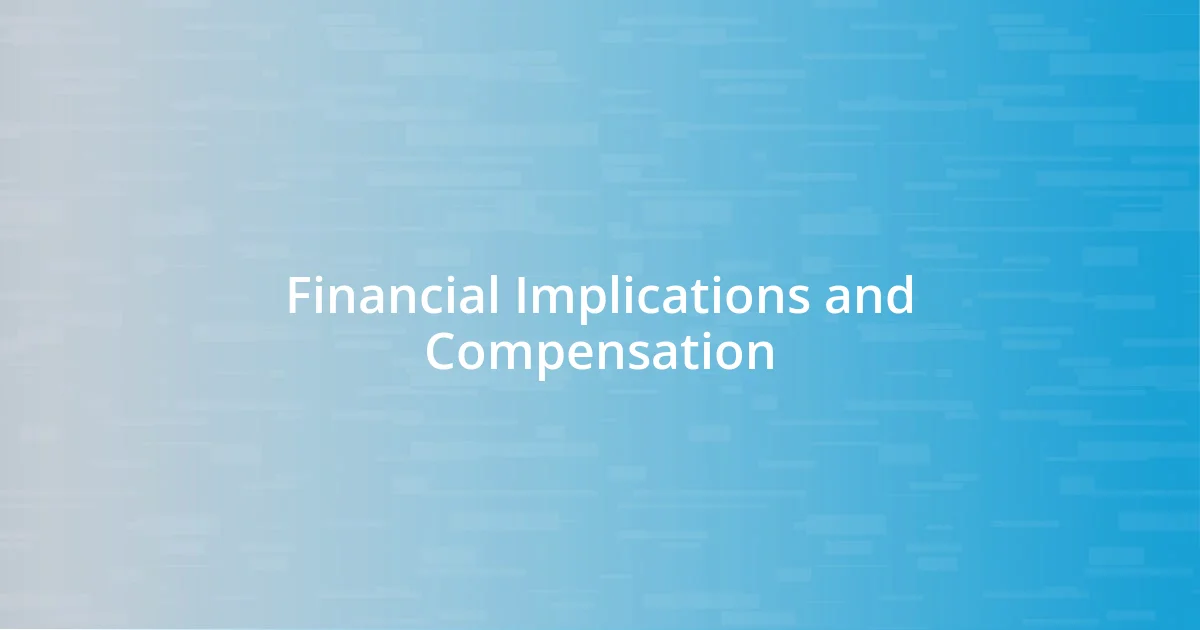
Financial Implications and Compensation
When it comes to financial implications after a car accident, I learned that understanding what compensation to expect is vital. Initially, I was unsure about the losses I could claim. My lawyer was instrumental in breaking down the expenses associated with the accident, from medical bills to lost wages. Have you ever felt lost in legal jargon? It helped me to know that I could be compensated for pain and suffering too, which often feels intangible but is incredibly significant.
One moment that stands out for me is when my lawyer explained the difference between economic and non-economic damages. Economic damages cover tangible expenses like vehicle repairs, while non-economic damages include emotional distress. It was eye-opening! I remember feeling a sense of empowerment when I realized my recovery could encompass more than just physical injuries. How often does one consider the emotional toll of an accident in financial terms? That knowledge shaped my expectations and gave me hope during a challenging time.
As I navigated the complexities of my case, tracking every expense became essential. I made it a habit to jot down all the little costs—from the gas used to attend medical appointments to the advanced treatments I sought. My lawyer advised me that thorough documentation could significantly bolster my claim. I found myself thinking about how easy it is to overlook small details when you’re focused on the bigger picture. Have you ever had surprising revelations about what you’re truly spending? In hindsight, all those records played a crucial role in ensuring I received the compensation I deserved.
















